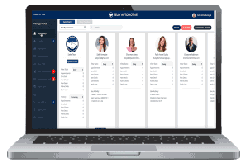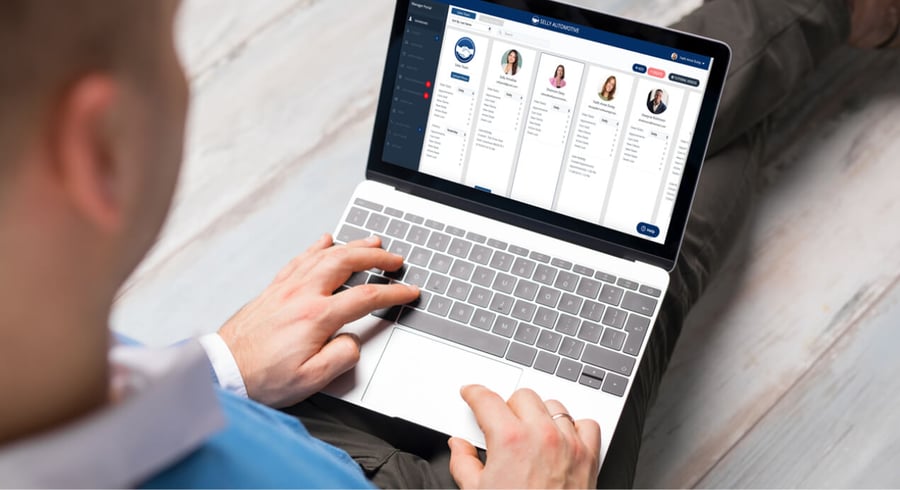Stay Updated With Us
Follow our blog and media to see the latest trends, tips, and disrupters in automotive
This guide is written for used car dealers who are researching the most important software solutions they need to run their dealership. We’ve kept the guide high level and simple for a general audience.
Every aspect of the auto industry has changed in the last decade. Inventory, sales, compliance, financing, and even service departments have been turned upside-down. Most importantly, the customer buying journey has changed. That means your toolbox needs to change, too.
Customer relationship management platforms, or CRMs, are absolutely essential in today’s highly competitive dealership industry. But not just any CRM will do. You need to use the right CRM for your dealership. That’s what this guide is all about.
Small and mid-size dealerships, in particular, often struggle with choosing the right CRM. That’s because they don’t think they need one. “I’m too small to use a CRM,” they say, “I can handle it myself.” Are you sure about that?
Here’s the problem: Customers don’t care whether you’re a national dealer group or a small independent. They expect an exceptional sales experience no matter what. And to deliver that experience consistently, you need a CRM.
In this guide, we’ll explain why every dealership needs a CRM. Then we’ll show you what to look for when choosing the right CRM for you. Finally, we’ll give you the top CRMs on the market today.
CRMs do more than store contact information. They are the central nervous system of every successful sales program. If you’re ready to transform your dealership, let’s get started.

There are hundreds of CRMs on the market today, but dealerships should use a CRM built specifically for the automotive industry.
An automotive CRM is a customer service, sales, and marketing platform designed for the unique buying journey of car customers. Most automotive CRMs integrate with existing Dealer Management Systems (DMS) to eliminate the need for duplicate entry of customer data.
There are four primary benefits of an automotive CRM (and many others we’ll list later on):
Lead Management – Keep track of sales leads no matter where they come from: online, over the phone, third-parties, or walk-ins.
Lead Nurturing and Generation – CRMs let you be the first to respond to new leads with features like Auto Responder or Auto Reply.
Improved Communication – CRMs help you keep track of all customer touchpoints, whether by phone call, text, or email.
Transparency and Reporting — Follow every deal from beginning to end to optimize your sales process. View and record each sales conversation, track KPIs, and measure the ROI of individual marketing channels.
With an automotive CRM, dealerships can automate and organize their sales, marketing, and customer service processes — and ultimately, sell more cars.
The largest dealer groups already understand the value using a CRM. However, small and mid-sized dealerships don’t always see it. The truth is, no dealership can thrive today without a CRM to manage their business.
Using an automotive CRM can mean the difference between a record sales month and going out of business. Here are some key benefits that a good CRM solution provides:
Dealerships get leads from numerous sources: website forms, third-party lead providers, their OEMs, online ads, offline ads, and old-fashioned walk-ins. CRMs let you store all your contacts in one place, and also track where the leads came from. Over time, you can see which channels produce the best results.
CRMs also help you track conversations over the course of days, weeks, and even years. You’ll have an entire conversation history for each contact, right at your fingertips.
According to a study by the Harvard Business Review, salespeople who contacted a lead within one hour were seven times more likely to qualify them, and 60 times more likely than those who waited over 24 hours. Some CRMs have auto-reply features so that no contact goes unacknowledged while you are busy with other tasks.
You need to know how many cars are being sold and who on the team is generating those sales. CRMs generate reporting that can help your sales team with forecasting, setting quotas, and tracking performance.
CRM platforms with text, email, and call management features let you document every interaction with your lead, whether they call, email, text, or walk-in. You don’t have to try to recall conversation details when you can pull the record from the CRM.
Keeping dealership/customer communications TCPA-complaint can be time-consuming, but not doing so could be even more costly. TCPA — the Telephone Consumer Protection Act — is a 1991 law that prohibits companies from sending any form of unsolicited communication to customers via telephone technology. That means you must get the customer’s consent to continue communicating via phone calls, text messages, or email. You must also honor their request to cease contact (opt-out), too.
Some CRMs let you pre-approve customers with soft credit pulls. With credit information in hand, salespeople can quickly put customers in the right vehicle. Soft pulls have no impact on a customer’s credit score, so they’re an easy sell.
Do you know which marketing channels are most effective? In a tightening economy and increased competition, dealerships large and small must make every marketing and advertising dollar count.
By tracking the source of new leads, CRMs help dealers figure out their highest- and lowest-performing marketing channels. Some CRMs even let you run custom reports to share with your team.
Every dealership is a little bit different, and so is every CRM. You don’t just want to copy the guy down the street. You need to choose the tool that’s best for you.
That said, we’ve used a lot of CRMs in our day. We know what works and what doesn't. The best CRMs have a core set of features that make you more efficient, productive, transparent, and consistent.
Here are the key features to look for when evaluating automotive CRMs:
|
 |
If an automotive CRM is cumbersome, clunky, and difficult to learn, your sales team won’t use it. They have enough on their plate apart from navigating a complicated new tool. It’s critical that your automotive CRM is easy-to-use and comes with a robust onboarding/training resources.
First, look for a CRM that has a modern, intuitive user interface. It should feel familiar to your salespeople, whether they’re young rookies or industry vets.
Second, the CRM vendor should offer comprehensive onboarding and training. The best CRMs will walk you through the onboarding process to ensure you’re setup for success. You and your team should have access to help guides and learning libraries for ongoing training.
Choosing a CRM without a strong training program could spell disaster for your team. This is a critical, but often overlooked feature of a good automotive CRM.
CRMs track sales opportunities and processes, while DMS systems are used for desking, accounting, and inventory management. Dealerships need to seamlessly move opportunities from their CRM to their DMS when they are ready to close deals. Ideally, your CRM of choice will integrate with your DMS.
For example, Selly CRM integrates with Frazer, Wayne Reaves, AutoManager, and dozens of other DMS’s.
But what if a CRM doesn’t integrate with your DMS? It’s not the end of the world, especially for small and mid-sized dealerships. The benefits of a CRM far outweigh the occasional chore of transferring data over to your DMS.

Whether you’re a one-man show or you run a team of salespeople, your sales process needs to be systemized. CRMs with built-in voice and text messaging management go a long way toward that goal. They help dealerships maintain transparency, consistency, and accountability on their sales teams.
When evaluating CRMs, make sure the platform can:
Track and record phone calls made through the platform
Assign follow-up tasks
Route incoming calls directly to the sales rep handling the deal
Keep the dealership TCPA-compliant with opt-in/opt-out messaging consent
Enable customers to text the dealership directly from your website
Automate messages
Create templates for common customer messages
Store recorded phone calls for use in sales training
No more looking for pieces of papers or rifling through file cabinets. Keep all customer communication in one place: your CRM.
Email replies will help you streamline customer communication even further. Setting up automated email replies will allow your team to respond quickly when leads make contact — a critical factor in winning the sale.
You don’t run your dealership from your desk. You’re on the sales floor, out on the lot, and at auctions buying the best inventory. That’s why dealerships should invest in automotive CRM that has both mobile and desktop platforms.
You need a CRM that can be accessed from anywhere — on a Mac or Windows computer (desktop or laptop), tablet, or mobile phone. Cloud-based CRMs with mobile and desktop apps ensure your information is saved across all devices. No data reentry necessary.
If your dealership has multiple lead generation sources (Dealer.com, AutoTrader, etc.), you can’t afford to guess how these sources are performing. Choose a CRM with a marketing channel analytics dashboard, so you have a complete picture of all of the dealership’s lead sources.
Look for a CRM that produces clear, concise, and easy-to-understand marketing analytics. It should include these specific features:
|
Find a CRM that allows you to manage all meetings and tasks associated with the deal in one place. Sales staff can track the status of the deals they’re working on, and sales managers can review the status of every deal in the shop on the feature dashboard.
CRMs keep your team on track with every deal, ensuring follow-ups and lead information never fall through the cracks.
Finding the right automotive CRM doesn’t have to be time-consuming and overwhelming. It all starts with understanding the specific needs of your dealership. For example, smaller dealerships don’t need all the bells and whistles (or the price tag) of large, enterprise-level CRMs. Find an option with the right features and price for you.
There are dozens of CRMs on the market. Below are the best CRMs for three different categories:
Independent and BHPH Dealerships: Selly
Franchise Dealers: VinSolutions
General Purpose: Salesforce

Selly CRM is one of the few CRMs built exclusively for independent/BHPH dealers and one-man shows. It was also ranked by FitSmallBusiness.com as Best Overall Automotive CRM. Selly's platform includes only the most important features for small and mid-size dealers:
Easy onboarding and training
Integrations with dozens of popular DMS’s
Voice and text messaging management
Automated email replies
Cloud-based platform
Market channel analytics
Appointment and task management
Selly is a great value for independent and BHPH stores. They understand the unique challenges that small dealerships face: too many hats to juggle, not enough time or manpower.
Starting at under $100 a month, Selly Automotive CRM is a perfect tool for independent and BHPH dealers ready to ditch sticky notes and pieces of paper to record leads.
VinSolutions is a popular and highly-rated CRM for large franchises and dealer groups. It has a deep arsenal of features that are important to large organizations, like integrations with OEMs and tracking factory rebates.
Franchise dealers also need to personalize their work processes, and VinSolutions allows them to do just that. The CRM platform offers a robust customer support team and resource hub for power users.
However, VinSolutions is not recommended for small-to-midsize dealers. It comes with a steep price tag and an overwhelming set of features that used car and BHPH dealerships don’t need.
Salesforce is the most popular and widely-used CRM by large corporations, small businesses, and nonprofit organizations. The company offers a range of customizable CRM tools — customer/lead management, data management, and more — that is tailored to the long list of businesses and industries they serve.
Salesforce supports its business customers by providing a wealth of online and phone-in user support, tutorials, online classes, and webinars – general and industry-specific. The pricing structure is tiered according to the size of the business and the number of Salesforce users.
Even though Salesforce practically invented the modern CRM, it lacks critical features for dealerships, like DMS integrations.

Automotive CRMs aren’t just for large dealerships. EVERY dealership should use a CRM to streamline their business and bring in more sales. And those who refuse to change with the times risk going the way of the Model T.
CRMs do so much more than store your contact information:
They make you look prompt and professional with new leads
They help you maintain compliance
They systemize your sales process
They can even provide new revenue streams with financing
CRMs are like rocket fuel for your business.
If you’re an independent and BHPH dealer, listen up. You have a different set of goals and requirements than franchise dealerships. That means you need a different type of CRM. To learn more, download our guide dedicated to independent dealers:
Looking for more information? Here are a few Frequently Asked Questions about Automotive CRMs:
Customer Relationship Management (CRM) is a sales and marketing platform that helps businesses collect, organize, and manage their work processes.
CRMs help dealerships manage and follow up on leads, while DMS platforms are used to process the final sale and manage the back office. DMS platforms help dealers manage inventory, financing, warranty, licensing, and insurance information. Dealers need to have both an automotive CRM and a DMS.
General purpose CRMs strive to be all things to all of the industries they serve. Automotive CRMs have specific tools, features, and add-ons that small and large-scale car dealerships need. They are also more likely to integrate with your DMS and other dealership platforms.
Yes, even independent dealerships can benefit from using a CRM. In fact, it’s critical.
Large dealerships are certainly using a CRM to streamline sales and maintain customer records. That means you should do the same. Having an automotive CRM evens the playing field and makes the little guys as competitive as the bigger shops.
Built-in CRMs are never as robust as standalone options. You may be able to store contact information, but you’ll be missing out on all the rest of the features and benefits we covered in this guide.
Yes, they do. Independent dealers simply don’t need all the features and functions of a large CRM. Franchises need integrations with OEM-approved DMS platforms and the ability to track rebates. For independent dealers, easy onboarding and streamlined communications are the most important features.
It’s not the end of the world. Automotive CRMs like Selly can work as a standalone tool. The benefits of using a CRM will far outweigh the occasional chore of transferring data to the DMS.
Follow our blog and media to see the latest trends, tips, and disrupters in automotive
Get expert advice on getting your CRM up-and-running fast. You don't have to be a big dealer to run your sales team like one.
© 2026 A1 Software Group Inc. All Rights Reserved.